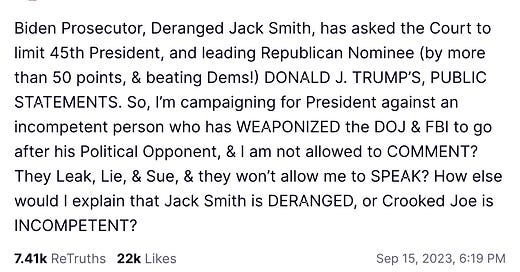Welcome to the Weekend Wrap! Here are last week’s white collar highlights:
Trump Prosecutions
D.C. Federal Case - January 6 Allegations
Gag me? — On Friday the government filed a motion for an order to “ensure that extrajudicial statements do not prejudice these proceedings” — in other words, for a gag order against Trump and his attorneys. The introduction to the motion is powerful:
As set forth in the indictment, after election day in 2020, the defendant launched a disinformation campaign in which he publicly and widely broadcast knowingly false claims that there had been outcome-determinative fraud in the presidential election, and that he had actually won. In service of his criminal conspiracies, through false public statements, the defendant sought to erode public faith in the administration of the election and intimidate individuals who refuted his lies. The defendant is now attempting to do the same thing in this criminal case—to undermine confidence in the criminal justice system and prejudice the jury pool through disparaging and inflammatory attacks on the citizens of this District, the Court, prosecutors, and prospective witnesses.
The motion begins with examples of individuals who were subjected to threats and harassment after being attacked by Trump for refusing to support his claims of election fraud. It then provides multiple examples of Trump’s social media posts since he was indicted that attack the judge, prosecutors, and citizens of D.C.
The government argues that Trump’s inflammatory statements are likely to damage the administration of justice: “Put simply, those involved in the criminal justice process who read and hear the defendant’s disparaging and inflammatory messages (from court personnel, to prosecutors, to witnesses, to potential jurors) may reasonably fear that they could be the next targets of the defendant’s attacks.”
Prosecutors are seeking an order restricting statements by Trump and his counsel concerning the identity, credibility, or testimony of any prospective witness, and prohibiting “statements about any party, witness, attorney, court personnel, or potential jurors that are disparaging and inflammatory, or intimidating.” They also requested an order prohibiting the defense from contacting potential jurors and conducting jury studies without notice to and approval from the court.
As if to provide more evidence in support of the motion, Trump responded Friday on Truth Social with this:
Many thought Smith would avoid taking this step and that Trump was trying to bait prosecutors into seeking a protective order so he could claim Biden’s Justice Department is trying to silence him. It’s a sign of how bad the attacks have been that prosecutors felt compelled to act anyway. If the motion is granted there is no doubt Trump will use it to portray himself as a political victim and a martyr for the First Amendment. But it seems like a necessary move. Trump’s attacks, although not unusual for him, are clearly dangerous. Given the reach of his media presence they have the potential to influence witnesses and potential jurors or to persuade his followers to act against them.
The other fascinating thing to game out here is: if Judge Chutkan grants the order, what does she do if (when?) Trump violates it? She has indicated in the past that his inflammatory comments could cause her to move up the trial date. She could find him in contempt, sanction him, and even order him locked up pending trial. As I’ve noted before, that would result in the kind of showdown I’m sure prosecutors and the judge would like to avoid and that Trump might relish — so long as he ultimately was able to stay out of prison, anyway.
Recuse me? — On Monday Trump’s attorneys filed a motion asking Judge Tanya Chutkan to recuse herself and have his case assigned to a different judge. As Trump motions go this one is not completely crazy, but it should not succeed.
Keep reading with a 7-day free trial
Subscribe to Sidebars to keep reading this post and get 7 days of free access to the full post archives.




